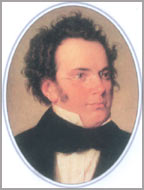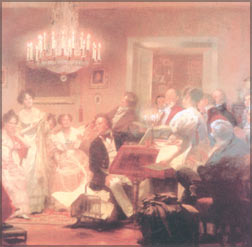Franz Schubert: the prolific scorerMUSIC: Born in Vienna, a city famously linked to great composers such as Mahler, Mozart, Gluck, Hydn, Bruckner, Brahms, etc. to mention a few among others, Franz Schubert (31-01-1797) to 19-10-1828) was the only scion of them to have been born in Vienna, not forgetting the magnificent four generations of Stauss which makes Vienna the Mecca of classical music an immortalised over the centuries.
With my passion of classical music, I have even heard classical overtures in trees, the wind and in the winding lazy waters of the Danube during my stopover in Vienna. One just gets carried away if his mind is clogged with the music of these great scorers. No symphony orchestra would perform without even a single melody of Schubert. Father Schubert was a school teacher who survived barely over poverty line in order to nurture his large family. However, only a few siblings survived into adulthood. Son Schubert was born in a house at Haimmelpfortgrund, now preciously known as No. 54, Nassadorferslrauss, the present Schubert Museum. During his time, the building was made up of several small apartments which father Schubert had rented out two units for that little extra income. The rest of the building was made into school rooms that were located on the ground floor while the family lived in one unit.
When Schubert was round five years of age, father Schubert moved into a better premises that enabled his son to attend school as a full time pupil under his brother. Schubert showed early signs of his genius when he was removed to this better environment and thereafter, he was trained as a chorister for the Chapel in the Imperial Court. He impressed his examiner so much which resulted him being awarded a five-year scholarship but was subject to a prison-like routine where he gathered a good deal of knowledge in the music of Haydn and Mozart. He was soon playing for the school orchestra and studying Beethoven. This was the start to his phenomenal career and he rose rapidly, learning and playing under famous music directors of his time. Yet, this did not make his father happy who was doubtful of his son's future in the music industry. Father Schubert persuaded his son to take to teaching. Reluctantly and to oblige his father, Schubert took up to teaching profession for a period of three years and disliked the intensity as his mind was full of music and nothing else. However, during these few years, Schubert wrote the Fourth Symphony along with several songs, quartets and five operas. Very strangely, though he wrote many operas for the voice, none were successful enough for vocals and this aspect of his career, still remains a mystery. Bold stepBy 1816 he had had enough of teaching and quit while taking a bold step into the world of music. He had no difficulty in embarking on it as he struck a friendship with the influential, Franz von Scholber. Along with Scholber, many were willing to give him food and lodging. He had the good fortune to meet the famous singer, Michael Vogl who helped to spread his music around. Schubert also came in contact with powerful people from the literary circle. He had climbed the ladder of society faster than the spread of his music though he was at an advantage on the basis of this situation. The rich and the powerful came to hear and see him play. He supplemented his income when these important people wanted him to teach their siblings music. By 1821, when he was on the verge of becoming a virtuoso composor, his work was considered too modern for his era. But at last a breakthrough came with his first songs. Erilkong, Gretchen and Esterhazy for which he made his first journey out of Vienna. His heavy drinking came in the way and following his success after the publication of his songs on public demand. He led astray again after a customary bout of drinking by liquor addicted friends who also took him into a house of ill-fame. In 1823 his health started failing after he contacted syphilis. From this point onwards he slipped badly both in his music and in himself. Yet an occasional ray of hope seized him when his score for the play Rosamunde became widely popular and greatly praised with only two nights of staging it. The score was printed and published in 1824. InspirationThroughout his life Beethoven was his inspiration and he admired his music but the irony of it was that Beethoven lived within a walking distance but Schubert never plucked enough courage to meet his hero. The following couple of years saw him in despair and loneliness. In Schubert's final year in 1828, he became gravely ill and died leaving behind only his clothes, few pieces of music and manuscripts that came into his brother's possession. He was buried next to Beethoven at whose funeral he had been a pallbearer in 1827. The epitaph on his tomb reads; 'The art of music here entombed, A rich possession, but even fairer hopes' (He died at 31) Schuman's best scores No. 19 Little Romance No. 10 Merry Peasent Piano Concerto in A Minor. Op. 16 Allegro Affettuoso Intermezzo (Andantino grazioso Allegro vivaca) Song-cycle Winterreise String Quintet in C Trout Quintet Ninth Symphony Symphony No. 1 - Spring Symphony No. 3 Symphony No. 4 |
||
|
.................................. |









